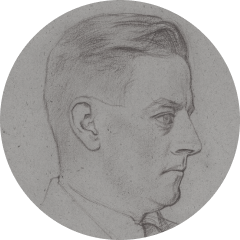Frederic Manning
(1882–1935)
Frederic Manning (1882–1935): Australian writer who settled in 1903 in England, where he came to know artists and writers including Max Beerbohm, William Rothenstein, Richard Aldington and Ezra Pound (the latter would compliment him as ‘the first licherary ComPanionship in Eng/ of Ez’); author of Scenes and Portraits (1909; 2nd edn, revised and enlarged, 1930). Despite being an asthmatic, he served in the ranks (Shropshire Light Infantry) in WW1, being involved for four months in heavy fighting on the Somme: this experience brought about his greatest achievement, a novel about the Western Front, The Middle Parts of Fortune (privately printed, 1929; standard text, 1977; expurgated as Her Privates We, credited pseudonymously to ‘Private 19022’, 1930; republished in full, with intro. by William Boyd, 1999) – ‘the best book to come out of the First World War’, Eliot is said to have judged it.
In a letter to Richard Aldington (6 July 1921), Eliot described Manning as ‘undoubtedly one of the very best prose writers we have’; and he wrote of him in a later year: ‘I did not know him well myself, though I have met him – I think directly after the first World War – and I have a precious copy which he gave me of Her Privates We and later I went to his funeral in Kensal Green … I remember him as a very careful and meticulous letter writer – one of few people I knew who put the first word of the next page at the bottom of every page of their letter’ (letter to L. T. Hergenhan, 26 Oct. 1962). See Verna Coleman, The Last Exquisite: A Portrait of Frederic Manning (1990).
